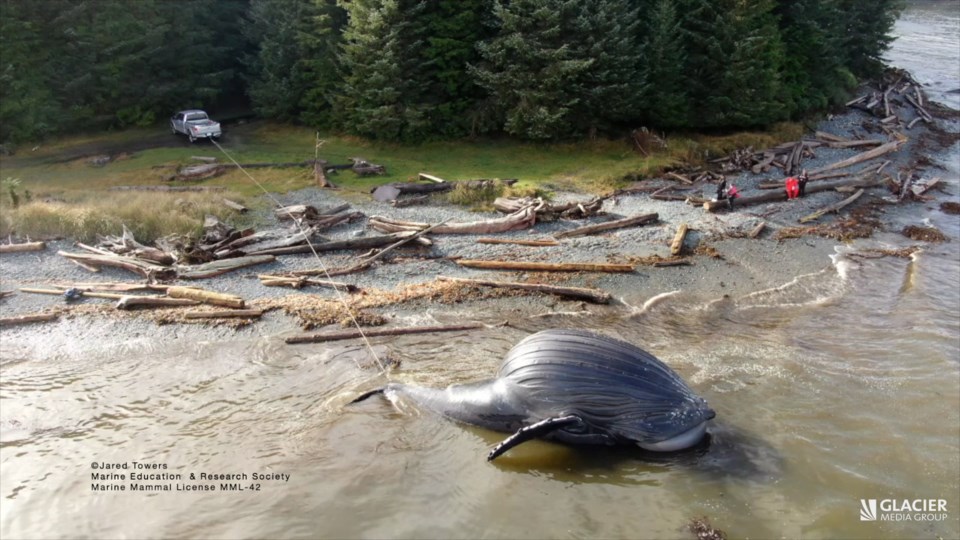Chris Ashurst was exploring the remote island of Haida Gwaii on a misty Sunday morning when he came across a large whale carcass washed up on shore.
“It was a big one too, about 13 metres long,” he recalls.
His partner Ellen and their dog were camping a few kilometres south of Cape Fife. He had decided to go for a walk when he made the discovery.
“It was getting a bit rotten, a bit of a smell but it wasn’t too far gone. It still had the humpback whale barnacles on its underside,” says Ashurst.
The local, who has lived on the island for more than 20 years, took out his camera to try and document the whale's tail and pectoral fins to send to Fisheries and Oceans Canada (DFO).
“Hopefully, with the photos that we took, we can help identify this one,” says Ashurst. "It gives us a bit of a story to its life and if it had a name and research associated with it. And importantly, we can, you know, maybe try to get clues as to how it died.”
During an interview with Glacier Media on Tuesday, Ashurst says another humpback carcass washed up just seven kilometres south of the Village of Masset.
A total of three whales have been confirmed dead by Fisheries and Oceans Canada within one month; two of them showed signs of blunt force trauma, leaving experts and researchers wondering what is causing the pulse of deaths.
“It’s sad that we have had so many in one month and we are hoping this trend does not continue,” says Paul Cottrell, marine mammal coordinator for the DFO.
On Oct. 12 and Oct. 15, a humpback carcass was spotted floating in the ocean near Prince Rupert, but it’s not clear where or if it washed up.
“We don’t know in this last month if it’s three or four because we weren’t able to ID that floating animal, and we have to be careful about double counting animals because they do float around,” says Cottrell.
On whale was found dead off Malcolm Island; she was named Spike and had blunt force trauma. On Nov. 5, a and had signs of blunt force trauma but experts have not been able to positively identify him. Finally, on Nov. 13, the third carcass washed up. It hasn't been identified due to the heavy decay.
"When animals die, they don’t always pop up and show up on the beach where we can do a necropsy,” says Cottrell. “Often, if animals die in less than 150 metres of water, they will bloat up and float up. If they die in very deep water, they tend to not come up to the surface."
On average, there are about four to 10 humpback whale deaths per year, he says.
“This is a pulse of deaths, so whenever you get that, it is a concern,” says Cottrell. “Overall, for this year, we are within a normal range for humpbacks deaths, a little on the high side but not anything that is super alarming. Having said that... the last month having three or four is more than normal.”
Jackie Hildering, a humpback whale researcher with the Marine Education and Research Society, hopes the public learns more about the threats to these massive mammals.
“It's very heavy to know that these whales have died,” she says, calling them "ambassadors."
“These are the ones that are the ambassadors for the ones that we don't get to see yet, which is so important. The importance of knowing who whales are as individuals.”
Hildering believes large boats might not even be aware if they strike a whale.
“The large vessel traffic is a potentially silent killer … it's like a hit and run, where you may not even know that you've hit a whale,” she says.
The researcher is asking the public to report a whale in distress or if they suspect it's been hit by a boat.
“These are big whales, hungry whales that don't have biosonar. They can be resting just below the surface and then they can suddenly come up,” she says. “Those vessels need to realize that those whales are not going to get out of the way.”
Necropsies are being conducted on the three whales, which could take months before the results are finalized.
“Our marine necropsies team is a dedicated bunch and we’ve been working hard to get to all of these animals and try to figure out why and how they died, and cause of death — that’s not always possible if the animal is decomposed,” says Cottrell.
DFO's 24-hour reporting line is 1-800-465-4336.
"We are only successful when people call in and observe these situations where we have dead, large whales,” he says. “We want to know immediately because the quicker we can get there, the better data we can get and hopefully determine the cause of death,” he said.


